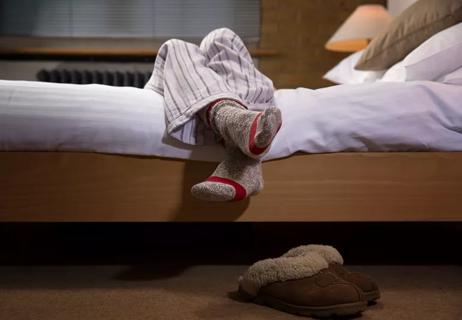A decline in estrogen can cause intercourse issues, but treatments can help

When you hear about menopause, what do you think of? Maybe you’re focused on fending off hot flashes. Maybe you’re worried about weight gain. Maybe you’re kind of excited not to have your period anymore.
Advertisement
Cleveland Clinic is a non-profit academic medical center. Advertising on our site helps support our mission. We do not endorse non-Cleveland Clinic products or services. Policy
What about changes to your sex life? For some women, menopause brings a decline in desire or uncomfortable intercourse. This can leave you and your partner feeling stressed, sad and confused.
But it doesn’t have to be that way. Women’s health specialist Holly Thacker, MD, explains how menopause impacts sex and libido and what you can do to better understand your body’s morphing menopausal needs.
When you go through menopause, your estrogen levels drop.
“The vagina and external genitalia have a very high concentration of estrogen receptors,” Dr. Thacker explains. “When you lose hormones, that tissue tends to shrink up.”
And lower levels of estrogen also cause a decrease in blood flow to your vagina, which can make it less sensitive to touch and less receptive to physical arousal.
All of that can make sex less desirable, more difficult, downright uncomfortable — and even painful. And to top it off, the emotional changes that often accompany menopause can cause you to lose interest in sex.
So, what’s a menopausal gal to do? First, know that “grin and bear it” isn’t what the doctor ordered. Three of the most common concerns related to sex during menopause are vaginal dryness, pain and a lack of desire — and there’s help for each of them.
Advertisement
“The good news is that there are both hormonal and nonhormonal treatments,” Dr. Thacker says. “No woman should suffer pain or dryness through sexual activity.”
Less estrogen can mean less vaginal lubrication. One of the most common symptoms of menopause is vaginal dryness, which can make sex uncomfortable and frustrating.
Dr. Thacker explains some of the options:
But topical lubricants and moisturizers are just short-term fixes that only address your symptoms. “Anything that you put on to moisturize or lubricate might temporarily make you feel better, but it doesn’t change vaginal integrity,” Dr. Thacker says.
In other words, hypersensitivity at the entrance to the vagina won’t necessarily improve with lubrication. So, if the dryness doesn’t disappear, see your gynecologist. They can prescribe vaginal estrogen or other options like vaginal suppositories or nonestrogen oral medications.
When it comes to sex, the last thing you want is unintended pain. But for some women, vaginal dryness doesn’t just cause discomfort during sex, it’s simply painful.
Dry, fragile vaginal tissue can lead to vaginal atrophy, which can result in burning, itching, spotting and pain during intercourse. Some women may even experience friction burns while having sex.
“If you have changes in the vagina, do not wait until things are very painful,” Dr. Thacker cautions. “If you do, even when we treat the thin lining and make it healthy again — which we can do usually within a month — sometimes, the muscles of the vagina go into spasm because they remember the painful sexual activity.”
Advertisement
Painful intercourse can have other causes, too, so if you’re experiencing pain during intercourse, it’s wise to have a checkup. Conditions that can cause this issue include:
“If you’re experiencing pain with intercourse, it’s important to have an exam to determine the cause,” Dr. Thacker says.
First, let’s make one thing clear: Every couple’s sex life is different, and there’s no such thing as “normal.” But if your libido is lagging and it’s causing you unhappiness, that’s not normal — or doesn’t have to be.
What is menopause’s impact on your sex drive, though? Dr. Thacker says hormones aren’t the only factor in your sex life. Emotions play a big role, too. So, if menopause is taking a mental and emotional toll on you, you might find yourself less interested in sex.
“Try increasing your receptivity — your ability or willingness to enjoy sex — instead of your sex drive,” Dr. Thacker suggests. There are lots of tips to improve your sex life as you age, like:
Advertisement
There’s also a link between menopause and depression, as decreased estrogen levels can cause emotional turbulence — and depression can affect every aspect of your life, including sex drive. If you’re experiencing depression, ask your doctor for help feeling like you again, in the bedroom and beyond.
If nothing seems to help and you’re bothered by your sexual (dys)function, talk to your doctor — and try not to feel embarrassed. These are common concerns, and your healthcare providers are there to help.
“An integrated treatment approach can treat both medical and emotional issues associated with menopause,” Dr. Thacker assures. You deserve it!
Advertisement

Sign up for our Health Essentials emails for expert guidance on nutrition, fitness, sleep, skin care and more.
Learn more about our editorial process.
Advertisement

Estrogen loss contributes to bone loss, which significantly raises your risk of osteopenia and osteoporosis

Making certain changes to your diet, sleep habits and even your wardrobe may help lessen the impact of menopause symptoms

A women’s health specialist explains those cold flashes that come on quickly

Changing hormone levels can bring issues like brittle nails, indigestion, dry skin and new allergies (to name a few!)

The choices you make at mealtime could reduce hot flashes or make them worse

If you’ve noticed changes in your mood and mental health while going through menopause, you’re not alone

Missed periods, heavy periods, painful sex and frequent hot flashes are just a few symptoms worth discussing with your provider

At-home tests measure FSH levels in urine, but they can’t actually diagnose menopause

Even small moments of time outdoors can help reduce stress, boost mood and restore a sense of calm

A correct prescription helps your eyes see clearly — but as natural changes occur, you may need stronger or different eyeglasses

Both are medical emergencies, but they are very distinct events with different causes